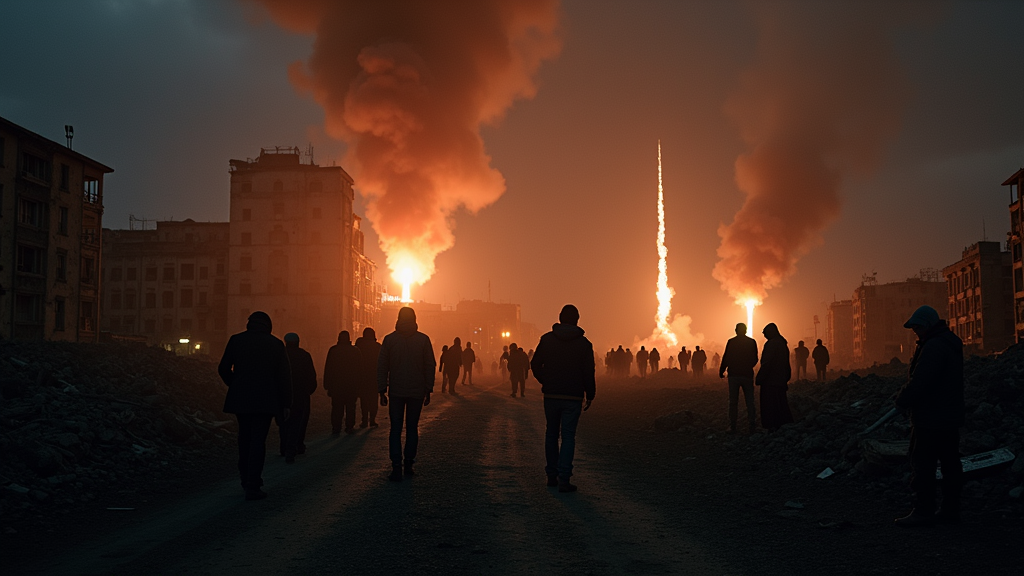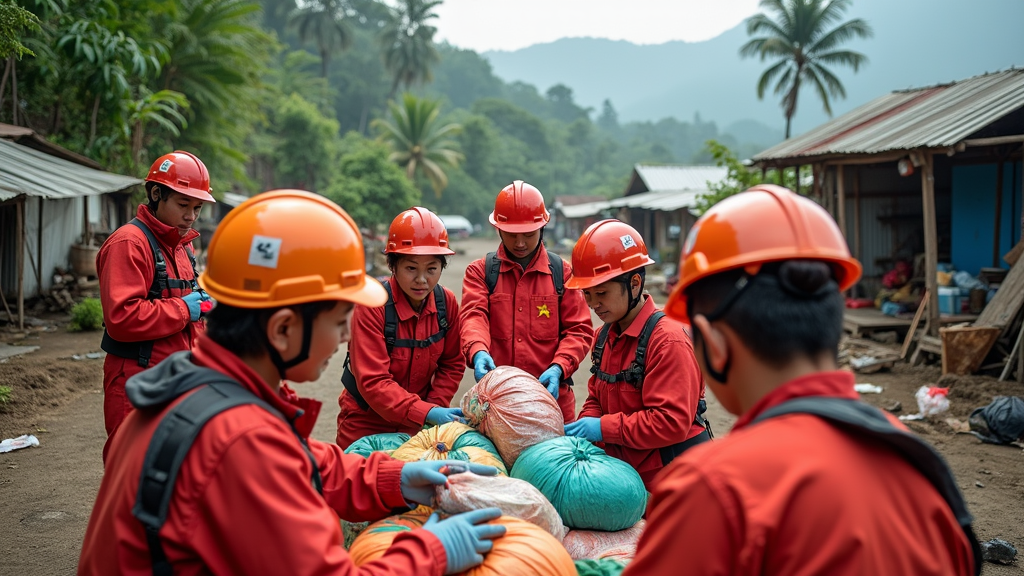Unveiling Russia’s Cynical Night Attack Justifications – April 2025
Cynical Justifications: Russia’s Nighttime Attack on Ukraine
April 24, 2025, marked a dark moment in the ongoing conflict between Russia and Ukraine, as the night sky over Ukraine was lit up by the terrible light of missiles. The Russian government attempted to present this brutal assault as a carefully justified response. Their narrative—crafted within the echo chambers of state media—claims the attack was merely a reaction to Ukrainian strikes on military targets in occupied territories. It’s a chess move in a grim game, where the pieces are lives, homes, and dreams.
From the Kremlin’s perspective, this escalation is portrayed not as an act of aggression but as “a symmetrical reaction,” a term that reeks of calculated detachment amidst the suffering it inevitably brings. Let’s look at this justification closely.
Analysis of Russian Justification
According to military experts, this recent assault was described as a “retaliation” for Ukrainian military operations, a premise that invites an unsettling question: What constitutes justification in a conflict where civilians bear the brunt of each decision made? The rosy language surrounding “responses” masks a harsh reality. The night of suffering yielded nine lives lost and sixty-three injured only in Kyiv, with extensive damage inflicted on civilian neighborhoods.
“The attack was a necessary measure,” they declare, cloaked in a veneer of legality. But where is the legality when homes are reduced to rubble? When air raid sirens replace lullabies? This rhetoric resonates on a sinister psychological level, enabling a disconnect from the bloodshed that ensues.
The Build-Up
Mikhail Zhirohov, a military analyst, offers insights into the premeditation behind Russia’s aggression, noting that for six months, they stockpiled missile systems in anticipation of conducting such assaults. This forethought contradicts claims of spontaneous retaliation and instead reveals a strategy steeped in malice—the capability for calculated destruction was amassed with intent.
Consequently, Russian media channels have saturated the airwaves with narratives painting the attack as a “forced measure,” framing their actions within a convoluted rationale. However, these words juxtapose sharply against the pulsating heartbeat of a nation ravaged by the impacts of war. It becomes a cruel irony to see the term “justification” being used for an event that, by its nature, seeks to erase lives and futures.
The Aftermath and Public Perception
In the wake of this assault, public sentiment across Ukraine has shifted into a realm of resilience tempered with sorrow. Citizens struggle with the palpable fear that accompanies each missile strike; its sound reverberates within their spirits. Amidst the rubble of their lives and the charred remains of what was once home, they foster a determination not easily quashed by the cold, meat-grinding machinations of war.
“How many more families must suffer?” This question lingers in the air, echoing among the survivors as they process the implications of yet another round of violence. As personal stories of loss spill into the public discourse, the message is clear: it’s not just about the numbers or rhetoric; it’s about humanity. With every lost life, with every destroyed home, the sheer weight of suffering adds to an unspeakable burden carried by a people yearning for peace.
In Berlin, Paris, and New York, the world’s eyes turn uncomfortably eastward; the public, armed with the knowledge of consequences, wrestle with their responses to this savage cycle. The cynical justifications laid forth by Russian leaders clash arrogantly with the visceral reality presented by the citizens of Ukraine.
As news reports echo across various outlets, it’s evident that these justifications—their absurdity—are under scrutiny. Where does one draw the line between self-defense and unprovoked offense, between a rightful struggle for sovereignty and the cold-blooded calculus of war?
In the labyrinth of narratives crafted by those in power, truth often becomes a casualty, alongside irreplaceable lives. And yet, within the chaos, the spirit of resistance ignites. As Ukraine stands proud against the dark cloud that seeks to engulf it, a burning resolve flickers in the collective consciousness—a reminder that the fight for dignity and existence is far from over.
Stay tuned, as we delve deeper into the implications of these events, the realities they reveal, and the human cost of adopting a narrative so detached from the truth.
For always fresh news, subscribe to our Telegram channel: https://t.me/World_news2035
The Broader Implications
As the dust settles on the tragic aftermath of the nighttime assault, the broader implications begin to unfurl, revealing a tapestry woven with threads of despair, resilience, and the relentless quest for justice. Each missile fired is a reminder of the precarious balance between aggression and sovereignty, pushing Ukraine to the forefront of an international stage now tinged with urgency and moral reckoning.
“We will not be silenced,” declares an elderly woman clutching her grandchild amidst the debris, her determination piercing through the heavy fog of war. This resolve echoes in the hearts of those affected and amplifies a familiar sentiment shared by countless nations that have faced similar aggressions. Whether or not the world listens closely enough remains an open question, but it is no longer the silence of complicity; it is the roar of outrage and solidarity against unprovoked violence.
International Response and Solidarity
In response to these harrowing events, global leaders are being compelled to act decisively. The rhetoric of condemnation is palpable, but words alone are not sufficient in a landscape where actions carry weight. Nations, from Europe to North America, are grappling with their moral obligations to support Ukraine—a nation caught in the throes of a struggle not of its choosing.
Diplomatic negotiations have accelerated, and military aid packages are being discussed in corridors of power. The cries of the innocent resonate in meetings, prompting policymakers to reevaluate their strategies. How does one quantify support? In arms? Economic relief? Or perhaps in the simple act of recognition as Ukraine stands firm against chaos?
Furthermore, voices on the ground remain instrumental in this fight for existence. Volunteer organizations are mobilizing, uniting to provide aid and support for those displaced. Community leaders weave stories of survival and galvanize hope, becoming the lifeblood of resilience amidst chaos.
Emotional Resilience and the Quest for Justice
Yet, emotions run high. Anger, grief, and hopelessness threaten to overshadow communal strength. People search for meaning in the madness, trying to reconcile the stark realities of war with their hopes for a peaceful future. The media plays a critical role in this narrative, bringing forth the stories of those impacted, seeking to humanize the figures behind the statistics.
“How could they justify such destruction?” a young father asks, tears brimming in his eyes as he surveys the charred remains of his home. In such a moment, words fail, but the essence of humanity speaks through shared grief. The quest for justice looms large, now crystallized into a demand for accountability from those who wield power.
As discussions on accountability emerge, the question turns to international law and the role of organizations like the United Nations. Can they act? Will they act? The poignancy of such queries reverberates through the hearts of a population yearning for redress, fueled by the injustices they have thus far endured.
A Future Reclaimed
In this complex narrative of suffering and perseverance, a glimmer of hope starts to take shape. Survivors refuse to let the past define their future; they grapple with loss while daring to dream anew. Each story shared, each voice raised in protest, adds to a growing chorus demanding change.
“One day, this will end,” murmurs a woman surrounded by her neighbors, united in both sorrow and defiance. They gather nightly, swapping tales of bravery, pain, and dreams of restoration. In these fragile, shared moments, community emerges as a potent force capable of standing tall against adversity.
As the world watches, the curtain rises on a new chapter, where narratives of conflict clash with aspirations for peace. Ukraine’s strength lies not only in its army but also in its unyielding spirit and collective heart. It becomes apparent that this battle for sovereignty extends far beyond borders—it’s a fight for the very soul of humanity.
Through cruel justifications and horrific consequences, a resilient nation rallies, stretching its arms toward the sun—a profound reminder that even amidst darkness, the light of hope can shine brightest.
For always fresh news, subscribe to our Telegram channel: https://t.me/World_news2035
For more updates and detailed reports, visit Newsmagazine.
To see the cynical justifications from the Russian perspective, check out the analysis here: RBC Ukraine.{
latest video
news via inbox
Subscribe to the latest news in the world of politics and technology







